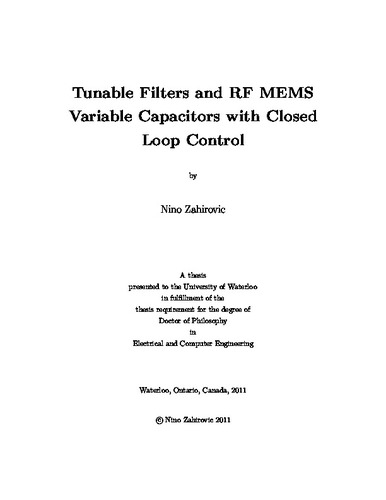| dc.description.abstract | Multi-band and multi-mode radios are becoming prevalent and necessary in order to provide optimal data rates across a network with a diverse and spotty landscape of coverage areas (3G, HSPA, LTE, etc.). As the number of required bands and modes increases, the aggregate cost of discrete RF signal chains justi es the adoption of tunable solutions. Tunable fi lters are one of the pieces crucial to signal chain amalgamation. The main requirements for a tunable fi lter are high unloaded quality factor, wide tuning range, high tuning speed, high linearity, and small size. MEMS technology is the most promising in terms of tuning range, quality factor, linearity and size. In addition, a fi lter that maintains a constant passband bandwidth as the center frequency is tuned is preferred since the analog baseband processing circuitry tends to be tailored for a particular signal bandwidth.
In this work, a novel design technique for tunable fi lters with controlled and predictable bandwidth variation is presented. The design technique is presented alongside an analysis and modeling method for predicting the final filter response during design optimization. The method is based on the well known coupling matrix model. In order to demonstrate the design and modeling technique, a novel coupling structure for stripline fi lters is presented that results in substantial improvements in coupling bandwidth variation over an octave tuning range when compared to combline and interdigitated coupled line fi lters.
In order for a coupled resonator filter to produce an equal ripple Chebyshev response, each resonator of the fi lter must be tuned to precisely the same resonant frequency. Production tuned fi lters are routinely tuned in the lab and production environments by skilled technicians in order to compensate for manufacturing tolerances. However, integrated tunable filters cannot be tuned by traditional means since they are integrated into systems on circuit boards or inside front end modules. A fixed tuning table for all manufactured modules is inadequate since the required tuning accuracy exceeds the tolerance of the tuning elements. In this work, we develop tuning techniques for the automatic in-circuit tuning of tunable filters using scalar transmission measurement. The scalar transmission based techniques obviate the use of directional couplers. Techniques based on both swept and single frequency scalar transmission measurement are developed. The swept frequency technique, based on the Hilbert transform derived relative groupdelay, tunes both couplings and resonant frequencies while the single frequency technique only tunes the center frequency.
High performance filters necessitate high resonator quality factors. Although fi lters are traditionally treated as passive devices, tunable fi lters need to be treated as active devices. Tuning elements invariably introduce non-linearities that limit the useful power handling of the tunable fi lter. RF MEMS devices have been a topic of intense research for many years for their promising characteristics of high quality factor and high power handling. Control and reliability issues have resulted in a shift from continuously tunable devices to discretely switched devices. However, fi lter tuning applications require fine resolution and therefore many bits for digital capacitor banks. An analog/digital hybrid tuning approach would enable the tuning range of a switched capacitor bank to be combined with the tuning resolution of an analog tunable capacitor. In this work, a device-level position control mechanism is proposed for piezoresistive feedback of device capacitance over the device's tuning range. It is shown that piezoresistve position control is ef ective at improving capacitance uncertainty in a CMOS integrated RF MEMS variable capacitor. | en |

